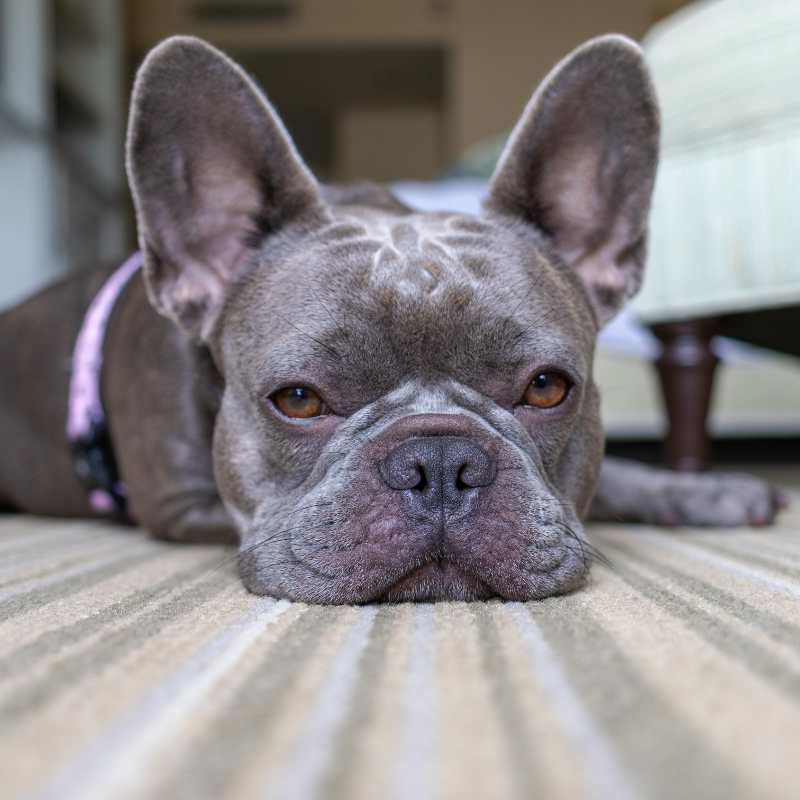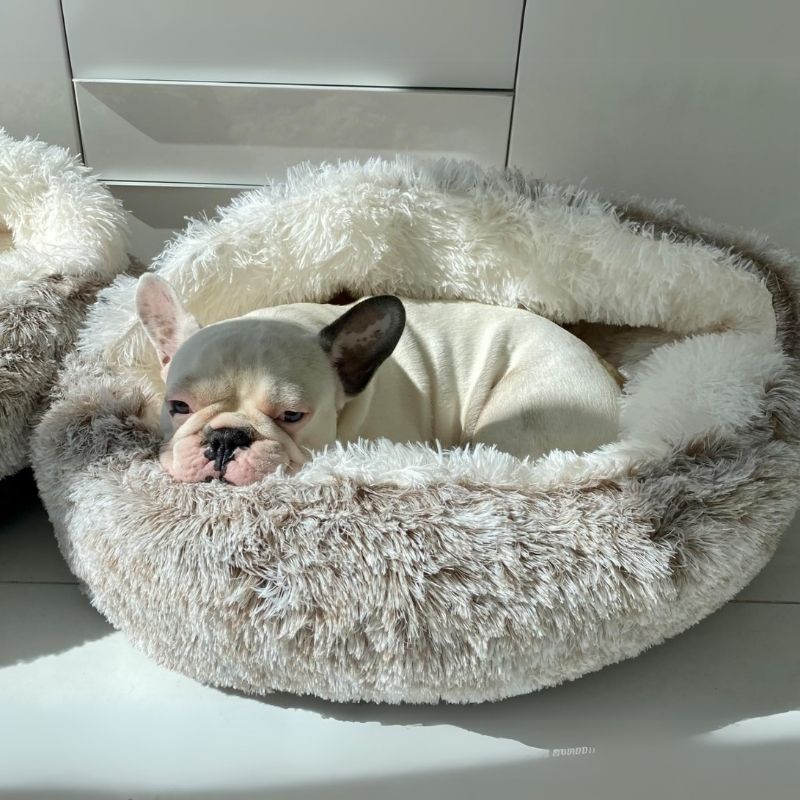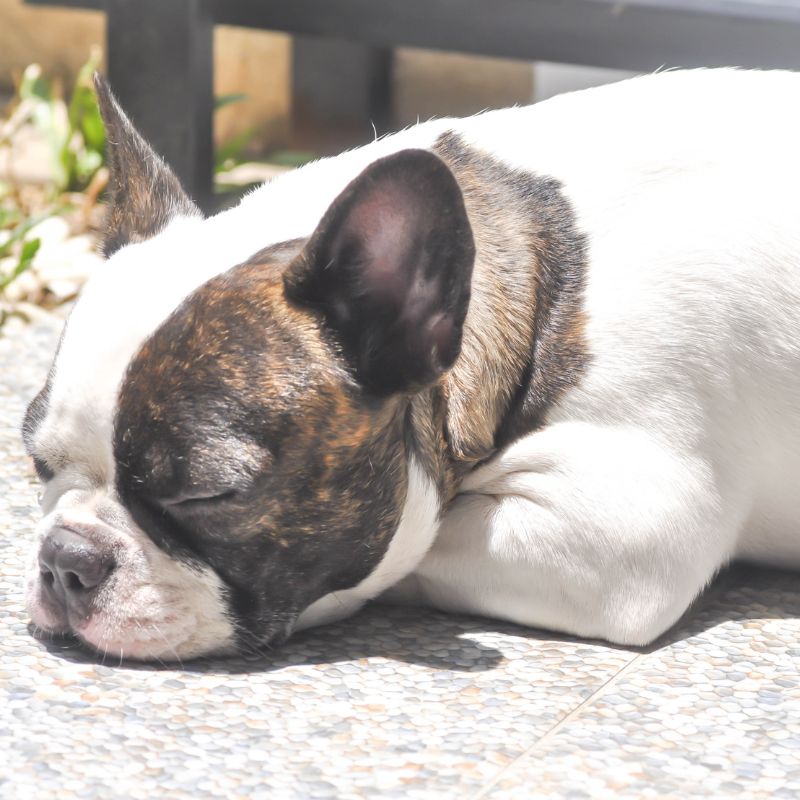5 Tips On How to Stop a French Bulldog from Snoring

French Bulldog snoring is a common issue that many new pet owners encounter and it’s definitely one of the most-annoying sounds you’ll hear in the middle of the night. If your Frenchie saws logs all night (sometimes snoring like a pig!), you’re not alone. These adorable pups are known for their heavy breathing and occasional snorts, even to the point of breathing like a pig during the day.
In most cases, a French Bulldog’s snoring is normal due to their short noses and flat faces. However, excessively loud snoring or snoring more than usual can be disruptive and might signal underlying problems. The good news is that there are several ways to help your Frenchie breathe easier at night.

Why Do French Bulldogs Snore So Much?
French Bulldogs are brachycephalic dogs. It means they have short snouts and compact airways. This cute “squishy face” anatomy is the primary reason they tend to snore a lot. Essentially, the structure of a Frenchie’s air passages makes airflow a bit of a challenge. Here are some of the common causes of French Bulldog snoring:
-
Short Airway & Soft Palate
In brachycephalic breeds like Frenchies, the soft palate (the tissue at the back of the roof of the mouth) is often elongated and can partially block the airway. They also have narrow nostrils and a narrow windpipe, which means breathing requires more effort. When these airway passages are restricted during sleep, the airflow causes vibrations in the soft tissues. That’s how snores happen.
In fact, Frenchies have the same amount of soft tissue in their short noses as a long-nosed dog has in a longer snout, so things can get crowded. This is why your little buddy might snore like a pig or make grunting noises. It’s simply harder for air to move freely through those teeny nostrils and throat.
-
Sleeping Position
Sometimes the way your Frenchie sleeps can increase snoring. If a dog sleeps on their back, the tongue and soft palate can relax backward and further obstruct airflow. Frenchies also love to sprawl in funny positions.
An “awkward” pose with their neck at a sharp angle or their head propped can kink their airway a bit. Many short-nosed dogs prefer sleeping on their backs (it might feel easier for them in that posture), but it often makes the snoring worse. You might notice when your pup flops over on their side or stomach, the snoring eases up.
-
Excess Weight
Those treat-motivated Frenchie eyes are hard to resist, but keeping your dog at a healthy weight is crucial. Overweight French Bulldogs tend to snore louder and more often. Extra fat around the neck and throat puts pressure on the airway, narrowing it.
Vets warn that obesity in dogs can lead to snoring (among other health issues) because fat deposits constrict their windpipe. If your Frenchie is a bit chunky, that might be a big contributor to the loud snoring. (Frenchie owners often jokingly complain their dog “got fat and now snores like a freight train!”) Keeping your pup lean can significantly reduce those nightly rumbles.
-
Allergies or Nasal Congestion
French Bulldogs can suffer from allergies or minor respiratory infections that cause congestion. Inflamed or swollen nasal passages make breathing noisy. Allergens like dust mites, pollen, or mold could trigger your Frenchie to snore or sniffle more than usual.
If you notice your dog also sneezing, snorting, or has a runny nose/eyes, allergies might be at play. Similarly, a cold or upper respiratory infection can temporarily turn your Frenchie into a snore machine until it clears up. Always monitor for other symptoms like nasal discharge or coughing in case an illness is brewing.
Is It Normal for a French Bulldog to Snore Loud or “Like a Pig”?
In short, yes – it’s normal for French Bulldogs to snore loudly or even sound pig-like. Most Frenchies are loud, heavy breathers and many are snorers. A consistent, rhythmic snore during sleep is expected in this breed. They might also snort when excited or do a “reverse sneeze,” which sounds like rapid snuffling – also common in Frenchies.
When to Be Worried About French Bulldog Snoring?
1- Pay attention if you notice your French Bulldog snoring more than usual or if the sound of the snoring changes suddenly. A sudden increase in snoring volume or frequency could indicate a new issue (like congestion, weight gain, or an allergy flare-up).
2- Snoring while awake is a red flag if it’s constant. Occasional snorty noises awake are normal, but if your dog seems to struggle to breathe even at rest (open-mouth breathing, wheezing, etc.), that’s not just normal snoring.
3- Extremely fast or labored breathing during sleep (almost snoring fast with quick, shallow breaths) can hint at sleep apnea or airway obstruction. Basically, if your Frenchie looks uncomfortable, is gasping, or their gums/tongue ever look bluish, those are signs of trouble.
4- Nasal discharge, coughing, or sneezing fits along with increased snoring might mean an infection or allergic reaction.
5- If your Frenchie is gagging, choking when eating, or struggling to swallow food, that could point to an elongated palate issue. Lethargy, reluctance to exercise, or getting tired very quickly (more than the usual couch-potato Frenchie behavior) can also indicate their breathing isn’t as effective as it should be.
How to Reduce or Stop Your French Bulldog’s Snoring
While you might not eliminate the snoring entirely (Frenchies will be Frenchies!), there are plenty of tips to minimize snoring and help your dog sleep more quietly and comfortably. Here are some effective strategies:
1. Keep Your Frenchie at a Healthy Weight
Because excess weight is a major snoring trigger, proper diet and exercise are key. If your French Bulldog is on the chubby side, work with your vet on a safe weight loss plan. Even a small drop in weight can reduce fatty tissue around the throat and ease snoring.
Measure your pup’s food portions, cut back on high-calorie treats, and ensure daily activity (short walks or play sessions). Not only will your Frenchie snore less if they’re fit, they’ll also be less prone to other health issues.
2. Adjust Their Sleeping Position and Bed
Sometimes a simple change in how or where your dog sleeps will help. Elevate your Frenchie’s head slightly when they sleep. Placing a pillow or a rolled-up blanket under their head can keep the airway more open. There are even special dog beds (like donut-shaped beds or ones with built-in headrests) that encourage a better sleeping posture for breathing.
Many owners find that giving their pup a curved bolster bed or donut bed helps in dealing with French bulldog snoring. For example, my Frenchie loves to curl up on their side, which reduces snoring. Ensure the bed is comfortable and large enough for them to stretch out a bit. Don’t let them sleep flat on their back if you can help it. Gently roll them to their side if you catch them in that position. A proper dog bed with a pillow or raised side can “trick” your Frenchie into a quieter sleeping pose.
In case you’re looking for the right bed for French bulldogs, then check our blog post What Is The Best French Bulldog Bed? Best Picks For Your Dog.
3. Create a Comfy, Airy Sleep Environment
Check the room where your Frenchie sleeps. Is it too warm or stuffy? Keeping the temperature cool and the air fresh can make a big difference. Use an air conditioner or fan for ventilation, especially in warmer months, so your pup doesn’t overheat.
Some Frenchie parents crack a window or run a humidifier at night – a bit of humidity can soothe the airways if your home is very dry. A humidifier near the dog’s bed adds moisture to the air and may ease snoring by preventing throat dryness.
Also, eliminate irritants: don’t smoke near your pet, and try to keep dust to a minimum. It’s also very important to wash and clean your French bulldog’s bed regularly. Just like you take care of your hygiene, that’s how you should take care of your dog’s hygiene too.
4. Avoid Late Night Meals or Overeating
Just like people, a dog with a very full belly might snore more. A large meal before bedtime can cause the stomach to expand and push against the diaphragm, making breathing slightly harder.
Try feeding your Frenchie dinner at least a couple of hours before bedtime. Don’t offer big midnight snacks because they can trigger French bulldog snoring. It’s the best not to give them food 2 hours before sleep. That’s how you give them time for digestion.
5. Keep Your Frenchie Calm and Cool
Excitement or heat can exacerbate snoring and breathing issues. Ensure your Frenchie has a calm winding-down routine in the evening. Vigorous play right before bed could leave them panting and then snoring harder.
Instead, have a quiet cuddle or gentle play session to relax them.
Also, mind the room temperature. French Bulldogs are prone to breathing heavily and snoring if they’re too hot. During summer months, aim for a cool, comfortable sleeping area. Using a summer cooling mat or cooling bed is also a good solution for preventing your Frenchie from heatstroke.
A stressed or overheated Frenchie will breathe faster (sometimes you’ll notice fast snoring when they finally doze off after panting), so keeping them chill – both literally and figuratively – will help.
French Bulldog Snoring Surgery – When Is It Necessary?
If you’ve tried everything and your French Bulldog is still snoring a lot – and especially if they have trouble breathing even when awake – it might be time to discuss medical intervention with a vet. “French Bulldog snoring surgery” usually refers to surgical procedures that alleviate the structural airway problems in brachycephalic breeds. Two common surgeries are:
- Stenotic Nares Surgery: This procedure widens the dog’s nostrils. Frenchies often have tiny “pinched” nostrils that barely let air through. In stenotic nares correction, a vet surgeon removes a small wedge of tissue from each nostril to open them up. After recovery, the dog can inhale more freely through the nose. This greatly reduces airway resistance and can cut down snoring and noisy breathing dramatically.
- Soft Palate Resection: Many French Bulldogs have an elongated soft palate (excess tissue at the back of the throat). During surgery, the vet trims this tissue to an appropriate length so it no longer blocks the airway opening. Sometimes, related tissues like everted laryngeal saccules (small nodules in the larynx) are also removed if they are obstructing airflow. The result is a clearer airway for the dog.
These surgeries, often done together as part of brachycephalic syndrome correction, can significantly improve a Frenchie’s quality of life. In fact, experts note that surgery to remove the extra tissues obstructing the airway can greatly improve your dog’s quality of life.
Conclusion: Sweet Dreams for You and Your Frenchie
Dealing with a French Bulldog that snores loudly can be a bit challenging, but it’s all part of the joy of owning this lovable breed. Remember that French Bulldog snoring is usually a normal quirk, a result of their adorable flat faces. Implementing small changes like a comfy bed with a pillow or using a humidifier can show quick wins. Most importantly, always keep an eye on your dog’s overall well-being. If you ever feel that your Frenchie’s snoring is too intense, or they seem unwell, don’t hesitate to reach out to a veterinarian. As the saying goes, it’s better to be safe than sorry.








 French Bulldog Jackets & Coats
French Bulldog Jackets & Coats French Bulldog Dresses & Skirts
French Bulldog Dresses & Skirts French Bulldog Hoodies
French Bulldog Hoodies French Bulldog Sweaters
French Bulldog Sweaters French Bulldog Shirts
French Bulldog Shirts French Bulldog Pajamas
French Bulldog Pajamas French Bulldog Costumes
French Bulldog Costumes French Bulldog Life Jackets
French Bulldog Life Jackets

 French Bulldog Collars
French Bulldog Collars French Bulldog Harness
French Bulldog Harness
 French Bulldog Backpacks
French Bulldog Backpacks








One thought on “5 Tips On How to Stop a French Bulldog from Snoring”